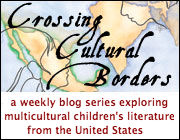 All the boarding school narratives discussed here on Crossing Cultural Borders feature girl protagonists. While boys also attend international boarding schools in real life, apparently they do not in fiction. But yes, American boys travel in books, too, though their experiences abroad prove to be more externally conflict-driven than the boarding school adventures of American girls. Here are a few travel narratives featuring young male protagonists.
All the boarding school narratives discussed here on Crossing Cultural Borders feature girl protagonists. While boys also attend international boarding schools in real life, apparently they do not in fiction. But yes, American boys travel in books, too, though their experiences abroad prove to be more externally conflict-driven than the boarding school adventures of American girls. Here are a few travel narratives featuring young male protagonists.
 In Danger Zone by David Klass, Jimmy Doyle loves basketball. When he joins the “Teen Dream Team” that will be representing the United States in an international basketball tournament in Rome, he is one of the few white players on a predominantly black team. As he travels with his teammates to Italy, Jimmy learns about prejudice, racism, and politics.
In Danger Zone by David Klass, Jimmy Doyle loves basketball. When he joins the “Teen Dream Team” that will be representing the United States in an international basketball tournament in Rome, he is one of the few white players on a predominantly black team. As he travels with his teammates to Italy, Jimmy learns about prejudice, racism, and politics.
 In Fallen Angels by Walter Dean Myers, seventeen-year-old Richie Perry, a high school graduate from Harlem, enlists in the Army in the summer of 1967 and must fight the war in Vietnam, where he experiences first-hand the terrors of battle and the American racism towards the Vietnamese soldiers and American black soldiers.
In Fallen Angels by Walter Dean Myers, seventeen-year-old Richie Perry, a high school graduate from Harlem, enlists in the Army in the summer of 1967 and must fight the war in Vietnam, where he experiences first-hand the terrors of battle and the American racism towards the Vietnamese soldiers and American black soldiers.
 Another conflict-driven narrative is featured in The Flame Tree by Richard Lewis. American missionary boy Isaac lives in Indonesia in 2001. After the attacks of September 11, 2001, his family decides to send him back to the United States. But before he can leave Indonesia, Isaac is kidnapped by fundamentalist Muslims, who try to indoctrinate him. Warning: some graphic violent descriptions near the end.
Another conflict-driven narrative is featured in The Flame Tree by Richard Lewis. American missionary boy Isaac lives in Indonesia in 2001. After the attacks of September 11, 2001, his family decides to send him back to the United States. But before he can leave Indonesia, Isaac is kidnapped by fundamentalist Muslims, who try to indoctrinate him. Warning: some graphic violent descriptions near the end.
 Finally, a book that is over 100 years old, Little Lord Fauntleroy by Frances Hodgson Burnett. Half-American, half-British Cedric must travel to Britain, where he learns how to be a lord from his paternal grandfather.
Finally, a book that is over 100 years old, Little Lord Fauntleroy by Frances Hodgson Burnett. Half-American, half-British Cedric must travel to Britain, where he learns how to be a lord from his paternal grandfather.
All these young men leave home with a clear job to perform while abroad: basketball player, soldier, missionary, lord-in-training. So while they are not receiving formal education at a boarding school, their experiences abroad are still educational, though typically of a more violent nature. It’s especially notable that the boys’ informal educations occur when they must deal with conflicts between their American culture and the culture in which they currently are visiting, whether it be the overt conflict of war or a more metaphorical but still competitive context of sports.
Special thanks to Claudia Pearson for helping with the list!
Next post: American Teens Touring Europe
 All the boarding school narratives discussed here on Crossing Cultural Borders feature girl protagonists. While boys also attend international boarding schools in real life, apparently they do not in fiction. But yes, American boys travel in books, too, though their experiences abroad prove to be more externally conflict-driven than the boarding school adventures of American girls. Here are a few travel narratives featuring young male protagonists.
All the boarding school narratives discussed here on Crossing Cultural Borders feature girl protagonists. While boys also attend international boarding schools in real life, apparently they do not in fiction. But yes, American boys travel in books, too, though their experiences abroad prove to be more externally conflict-driven than the boarding school adventures of American girls. Here are a few travel narratives featuring young male protagonists.


